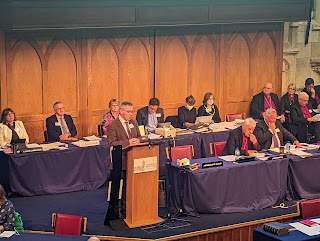irish Churches Blog Post: The Arctic is on fire and it’s about to be hit by a heatwave.
The Arctic is on fire and it’s about to be hit by a heatwave.
This is a headline as I write at the beginning of August 2019. The number of arctic fires in 2019 is ‘unprecedented’ according to the World Meteorological Organisation. Hundreds of fires burn in Alaska, Greenland and Siberia, some of them are 100,000 times larger than a football pitch. In July the average temperatures in Siberia were almost 6 degrees Celsius above average.
That headline seems to foreshadow the Biblical passages that explain how the earth will be destroyed. For example, 2 Peter 3:10–11
‘The heavens will disappear with a roar; the elements will be destroyed by fire, and the earth and everything done in it will be laid bare. Since everything will be destroyed in this way, what kind of people ought you to be? ‘
The last line in that verse echoed in my mind, ‘What kind of people out you to be?’ In an age of climate breakdown, as Christians, what kind of people ought we to be be? As christian communities across Ireland and beyond, what kind of churches ought we to be?
In 2015 Father Edwin Gariguez, a Catholic Priest who serves as the Executive Secretary of the National Secretariat for Social Action in the Philippines, wrote an article, We Have a Moral Imperative to Act on Climate Change. In November 2013 his country had been devastated by Typhoon Haiyan, the strongest storm ever to make landfall, and thousands of people had been killed and millions left homeless – the country found itself on the front line of the climate crisis.
Edwin Gariguez’s article is a passionate call for justice and change, he wrote,
The Church cannot remain a passive bystander. It is our moral imperative to give voice to the voiceless… If it is wrong to wreck the planet, then it is wrong to benefit from its wreckage; a growing global movement to divest from fossil fuels takes this ethos at heart.
I worked as a mission partner in South America for 8 years and I have seen the effects of climate change first hand: the spread of Dengue Fever, droughts and floods that severely impacted the poor in the Parguayan Chaco and shanty towns in Asuncion. So when I discovered that my church, the Church of Ireland, was funding fossil fuel extraction (at the time about 10% of the £250m investment funds was invested in oil and gas companies), the Holy Spirit flamed a burning desire within me for justice and change.
What kind of church ought we to be? A church that does not fund an industry that is destroying the planet or plunge millions of people into poverty and conflict.
So I set out to explain to the Church of Ireland why we should exclude these investments. I started a blog: the.Trews.com, took to Twitter and wrote letters to the Church of Ireland Gazette. I had a motion passed at my Diocesan Synod and the call for change grew louder when several other diocesan synods did the same.
In 2018 I proposed a motion at General Synod for full divestment from all fossil fuels by 2022; this was a bold move but the members of synod responded and the motion was passed. The following day the headline in the Irish Times read, ‘Church of Ireland to end investments in fossil fuel companies.’
Today, the Church of Ireland has only 2% of its investment funds in a single oil drilling company, and it is on course to have its investment and pension funds free from fossil fuel companies before the deadline of 2022.
The divestment movement has spread throughout Ireland. Universities, churches, local councils, MPs in Northern Ireland and TDs and the Dublin parliament have all committed to, or called for, divestment.
As individuals, when it comes to the climate crisis, many of us think our actions will make little difference, and we end up doing nothing. It is easy to fall into denial – ‘it’s not that bad’; or fatalism – ‘there is nothing we can do to change it’; or romanticism – ‘it will all work out in the end’.
But Christ calls us to action: to preach the gospel, feed the hungry and heal the sick; to store up treasure in heaven and overturn the tables of unethical traders. We need to challenge our churches to stop funding the climate crisis.
Ask your church to divest its investment and pension funds from fossil fuels.
Romans chapter 8 says that even though we are subject to sin we can have new life in Christ though the Holy Spirit. It says that creation too groans and is subject to frustration, but verse 19 says,
For the creation waits with eager longing for the revealing of the sons of God.
The Earth is laid bare, it is time for us to act.



Comments